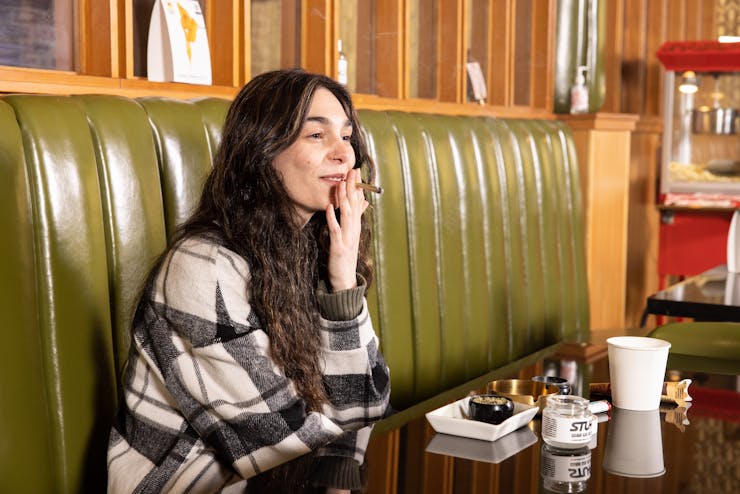A perspective from Boston University law professor Jay Wexler—a former law clerk for Justice Ruth Bader Ginsburg at the United States Supreme Court, and the author of the new Weed Rules: Blazing the Way to a Just and Joyful Marijuana Policy.
It’s a Tuesday night in Boston. I’ve finished my work for the day, so as on most evenings, I turn to my weed stash. I’ve got plenty of edibles, a tincture or two, and some vaping cartridges, but tonight I want the old-fashioned pleasure of smoking a joint.
No more sensual way exists, in my opinion, for enjoying cannabis than inhaling the fragrant smoke from a delicious j-bird; tasting the terpenes tickling my nose and tongue, and exhaling a cloud of smoke until the magic of marijuana envelops me from all sides.
I choose a strain, roll a joint, find my lighter, and then face the biggest decision of the night: Will I climb out to smoke on my fourth-floor fire escape, or leave the apartment altogether and light up in the alley next to the dumpster? Well, I’m 54. My sciatica is acting up, so crouching through the window will be painful and awkward.
But the alley risks disapproving looks from neighbors and hungry rats chewing my ankles. The weather in Boston feels about 37 degrees and windy on this spring evening—I’m going to freeze my ass off either way.

Weed may be legal for recreational use in more than 20 states, but there’s still almost nowhere legal to actually smoke it.
Such is the unfortunate situation too many of us face in our “legalization nation”: Weed may be legal for recreational use in more than 20 states, but there’s still nowhere legal to actually smoke it. Hotels prohibit smoking, as do most landlords and many condo boards (which is my situation). Using cannabis is illegal in federally-subsidized housing, and most states prohibit the public use of marijuana. Only homeowners can legally smoke weed on their property and even then, what if you have kids or your spouse doesn’t like the smell of cannabis?
This conundrum is bad enough for recreational users like me, but medical users fare far worse. What are cancer patients or people with Crohn’s disease supposed to do if smoking is the only way they can take their medicine? I sure hope they can bear standing outside for 15 minutes, and that it isn’t sleeting. The equity problem here is glaring: The well and the well-off get by, while the poor and sick suffer or risk legal retaliation. How can a state make it legal to grow, sell, and buy weed, but not provide legal places to smoke it?
States and cities must license more lounges

States could substantially reduce this problem by authorizing and encouraging the creation of social use establishments where cannabis users can come together in a public, social setting to enjoy their recreational drug of choice. As I detail in my new book, Weed Rules: Blazing the Way to a Just and Joyful Marijuana Policy, however, some states don’t allow social consumption lounges and cafes at all (thanks, Oregon and Washington!). Even the states that theoretically allow such lounges and cafes have erected nearly insurmountable barriers to their creation.
Cities and towns have the power to exclude them; imposing distance requirements make it impossible for business owners to find adequate space; burdensome regulations dictate what social use establishments can sell, allow, or provide (No alcohol! No tobacco! No smoking!). In short, states have all but ensured that hardly any social use spaces can open and operate. A few do exist, of course. Groundbreaking places like The Coffee Joint in Denver and Moe Greens in San Francisco should be celebrated and frequented, but demand still far outweighs supply.

Is it fair that beer drinkers can choose from 50 bars to enjoy their drug of choice while weed smokers have to duck behind alley dumpsters to enjoy ours?
Luckily, there is no constitutional prohibition of weed lounges, which means that we the people can wield the democratic process to encourage states to change their laws and allow for more cannabis consumption spaces. Many battles big and small remain along the road to full, federal legalization and normalization of marijuana. This is one of the big ones.
Is it fair that beer drinkers can choose from 50 bars to enjoy their drug of choice while weed smokers have to duck behind alley dumpsters to enjoy ours? Of course not. Lounges and cafes for people to come together and enjoy cannabis in a safe, social setting are essential for a society where marijuana use is considered acceptable and normal. Some of us absolutely need them. We all deserve them.
Until then, though, you can find me in the alley.


Jay Wexler is a law professor at Boston University, a former law clerk for Justice Ruth Bader Ginsburg at the United States Supreme Court, and the author of seven books including Weed Rules: Blazing the Way to a Just and Joyful Marijuana Policy (University of California Press 2023). He tweets @SCOTUSHUMOR.




